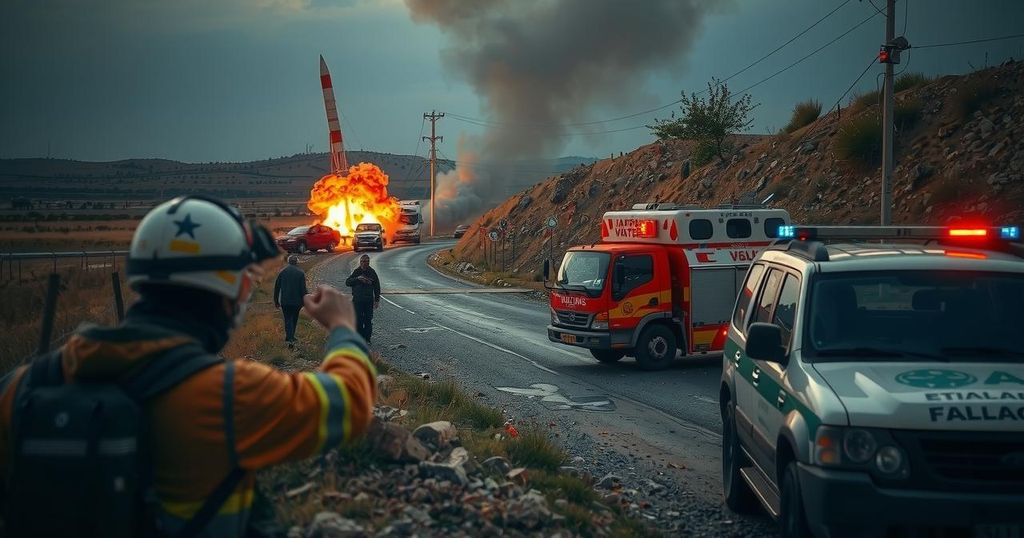Deadliest Rocket Attack from Lebanon Claims Five Lives in Northern Israel
On Thursday, rocket fire from Lebanon killed five people in northern Israel, including four foreign workers, marking the deadliest such incident since Israel’s military actions began this month. This attack coincided with U.S. diplomatic efforts to establish ceasefires amid escalating tensions in the region, particularly between Israeli forces and Hezbollah, which have resulted in significant casualties and displacement.
TEL AVIV, Israel (AP) — On Thursday, a rocket barrage from Lebanon resulted in the death of five individuals in northern Israel, marking the deadliest incident of this nature since the onset of Israel’s military actions earlier this month. Among the deceased were four foreign workers. This assault occurred amid ongoing diplomatic efforts from U.S. officials aiming to establish ceasefires in both Lebanon and Gaza, amidst a broader hope to diffuse heightened tensions in the region during the Biden administration’s concluding months. The merchant of this conflict, the Hezbollah militant group, has launched rockets, drones, and missiles into Israel, subsequently facing retaliatory action from Israeli forces since the initiation of hostilities triggered by Hamas’ attack from the Gaza Strip on October 7, 2023. The dynamic between Hezbollah and Hamas, both of whom receive support from Iran, continues to ignite violence across the region. The escalation greatly intensified in the preceding month when Israeli airstrikes targeted multiple sites in Lebanon, which reportedly resulted in the death of Hezbollah’s prominent leader, Hassan Nasrallah, alongside many of his key aides. Israeli ground forces penetrated Lebanese territory shortly after these escalations began. Details regarding the recent attack were disclosed by the Metula regional council, though specific information regarding the type of munitions deployed was not provided. The nationalities of the deceased foreign workers remain unidentified at this time. Metula, noted as Israel’s northernmost town, which is encircled on three sides by Lebanon, has faced substantial damage due to the ongoing conflict. The majority of its residents evacuated last month, leaving behind only security personnel and agricultural laborers. The Hotline for Refugees and Migrants, an advocacy group for foreign workers, expressed concerns about the government’s failure to provide necessary protections, permitting foreign workers to operate in proximity to the border without adequate safeguards. These agricultural locales are classified as closed military zones, accessible only with formal permission. In a video statement on Wednesday, Hezbollah’s newly appointed leader, Sheikh Naim Kassem, echoed the group’s firm resolve to persist in hostilities against Israel unless ceasefire terms that align with its expectations are negotiated. He asserted, “Hezbollah’s capabilities are still available and compatible with a long war.” Earlier that same day, the Israeli military advised residents to evacuate increasing sections of southern Lebanon as a result of ongoing airstrike operations across the nation that reportedly led to eight additional fatalities, per information from Lebanon’s National News Agency. The Israeli government has insisted on evacuating vast stretches of territory, encompassing principal urban areas in the southern and eastern regions of Israel. The Lebanese authorities estimate that since the conflict’s resurgence last year, over 2,800 individuals have lost their lives, with nearly 13,000 injuries reported, including the displacement of approximately 1.2 million people. Conversely, within Israel, military actions by Hezbollah have caused the deaths of at least 68 individuals, nearly half of whom are soldiers, leading to the evacuation of over 60,000 Israeli citizens residing in border towns and cities for more than a year.
The escalation of violence in the Middle East, particularly between Israel and militant groups such as Hezbollah and Hamas, has a complex historical context. Following the Hamas attack on Israel in October 2023, the ensuing military responses have resulted in significant casualties on both sides, with increased aggressions leading to widespread destruction and humanitarian crises. The dynamics of this conflict, including the involvement of Iranian-backed groups and the implications for foreign workers in conflict zones, have raised urgent concerns regarding security and civilian protection in the region.
The recent rocket fire from Lebanon that resulted in the death of five individuals, including foreign workers, underscores the intensity of the ongoing conflict between Israel and Hezbollah amid significant diplomatic efforts for peace. The situation remains precarious, with continued military operations and a humanitarian crisis developing as thousands are displaced and casualties rise. The potential for further escalation remains high unless ceasefire negotiations yield mutually acceptable terms for both parties.
Original Source: apnews.com




Post Comment